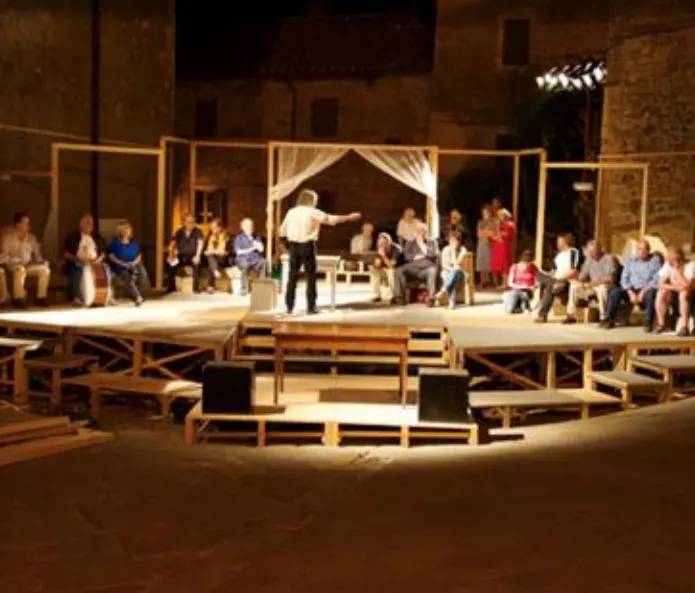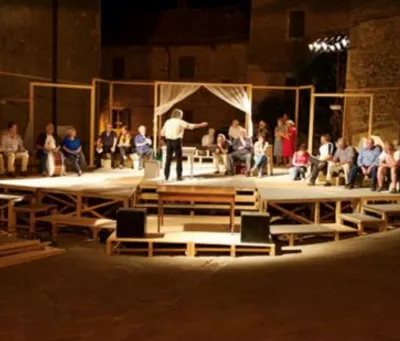Summary
‘Teatro Povero’ is a cooperative community initiative in the Italian village of Monticchiello, operating since the 1960s. At that moment, the village faced several changes as its main economic model collapsed. In the 1980s, the theatre group became a cooperative to promote culture, enhance the area's history and environment, and access funding.
Today, the cooperative employs 25 individuals annually and offers diverse services such as a tourist office, a museum, restaurants, workshops, and healthcare support. It is a crucial community resource, complementing institutions without replacing them. ‘Teatro Povero’ showcases community resilience and adaptability.
Results
The ‘Teatro Povero’ project has successfully achieved its goals through an innovative approach called 'autodramma' theatre and the establishment of the 'Cooperativa di Comunità'. The initiative has enhanced community resilience and well-being, despite economic and social challenges.
The outdoor theatre performances have not only preserved the local cultural heritage, but also attracted residents and visitors. Over the past few decades, the population has increased by approximately 15% (from 385 in 1975, to 460 in 2023).
The cooperative now employs up to 25 individuals each year, offering various services such as tourism, workshops, and basic healthcare. Providing these services and hosting events in the village is crucial. It not only adds value to the project, but also prevents people from leaving the area due to a lack of local services.
The cooperative has played a vital role in introducing and maintaining these services in the village. The project has left a lasting positive impact on the community, improving their sense of identity, economic opportunities, and overall quality of life.
Resources
Documents
Context
Monticchiello is a medieval village in Val d'Orcia, a UNESCO World Heritage site. Around fifty years ago, the population started to decrease due to people migrating to cities. The number of inhabitants went down from 935 in 1950 to 385 in 1975. In response to this, the Teatro Povero was established as a creative project to address the changes that came with a period of rapid transformation. It served as a platform for preserving their heritage and traditional values in the face of modernising influences while fostering a communal sense of identity and continuity. Thanks to the cooperative, the village of Monticchiello has retained its charm and historic significance, becoming an integral part of the community's cultural fabric. Although more than half of the population is over 50, there has been recent improvement in terms of demography, with 460 registered in the village in the 2020s
Objectives
The project's initial efforts centred on enhancing the village's infrastructure and services. These included tasks like constructing paved roads, implementing central heating systems, and ensuring vital public services. These initiatives wanted to improve the well-being and quality of life of the residents. Currently, their objectives are focused on preserving local identity, promoting cultural and artistic initiatives, offering community services, advancing social inclusion and education, driving local development and sustainability, cultivating an active and supportive community in Monticchiello and Val d'Orcia.
Activities,key actors, and timeline
In 1967, villagers started coming together during winter gatherings, which laid the foundation for the community that would later become the heart of theatrical performances. By 1980, this community officially established the Teatro Povero di Monticchiello, one of the earliest community cooperatives. They took an old barn and transformed it into a shared space for social and cultural activities. With the support of a social loan, the cooperative expanded its facilities, including cellar spaces. The old barn, now part of the theatre, serves multiple purposes. It offers local agricultural products and houses various amenities, such as a tourist office and a museum dedicated to traditional Tuscan theatre. The repurposed cellars have been turned into a conference hall with archives, a music school, and more. Furthermore, the cooperative's activities go beyond the theatre and include managing green spaces, serving as a newsstand, operating a museum, offering internet access, running restaurants and workshops, providing guesthouse accommodations, arranging tourist packages, supporting asylum seekers, delivering primary healthcare, maintaining a small library, offering refreshments, collaborating in managing the Museum of Traditional Tuscan Popular Theatre, and curating exhibitions and workshops.
Success factors/lessons learnt
The model's core strength lies in active community engagement and participation. All local residents are members of the cooperative and are involved in decision-making and project implementation. This ensures that solutions meet the specific needs of the community. The capacity to offer a wide range of activities and services has been pivotal, addressing diverse community needs and promoting overall well-being and resilience. Acting as an "embedded intermediary" between the community and external networks has amplified the model's impact, facilitating collaborations across various sectors and accessing external resources. The model stands out by balancing cultural preservation with innovation, as seen in the Teatro Povero. Financially, it generates revenue through commercial activities like ticket sales, the museum, restaurants, a guest house, tours, and a bicycle repair shop. Teatro Povero uniquely initiated its activities solely through community resources, later using public funding to expand. Environmentally, it champions local resources and minimises ecological impact. The model's adaptability and focus on community strengths make it applicable to other regions facing similar challenges and sharing similar aspirations.

